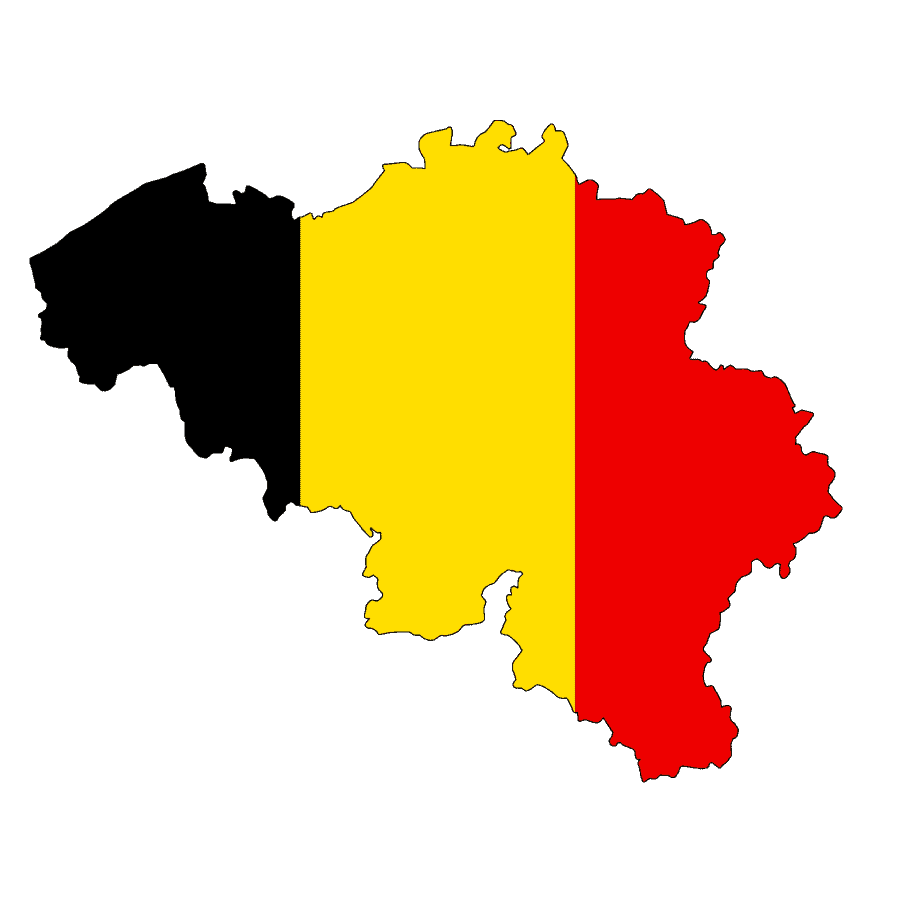
French is one of the most widely spoken languages in the world and is the official language of 29 countries. In Europe, French is spoken in France, Switzerland, Monaco, Luxembourg, and Belgium. For many years, French was the language of diplomacy in the EU and UN. Although English has since surpassed it, French is still a popular choice for language learners and is growing rapidly in places like Africa.
As one of it’s 3 official languages, French is the native spoken language of 39% of the population of Belgium and a second language to 49% of Belgians. In total 88% of citizens speak it, making French the most spoken language in Belgium. It is most heavily used in the southern part of the country.
If you are interested in learning more about spoken French in Belgium, read on. We will discuss how French is commonly used in Belgium, specifically where it is spoken, the reasons why French is one of the official languages, and the differences between French and Belgian French.
Contents
- 1 How Common Is French In Europe?
- 2 How Common Is French In Belgium Itself?
- 3 Spoken French Versus Other Languages of Belgium
- 4 Is French Common On Belgian Television And Movie Screens?
- 5 Is French Common In The Belgian Workplace?
- 6 Why Do Belgians Speak French?
- 7 Differences Between French and Belgian French
- 8 Should I Learn French To Function In Belgium?
- 9 Final Talking Point About Commonly Spoken French Is In Belgium
How Common Is French In Europe?
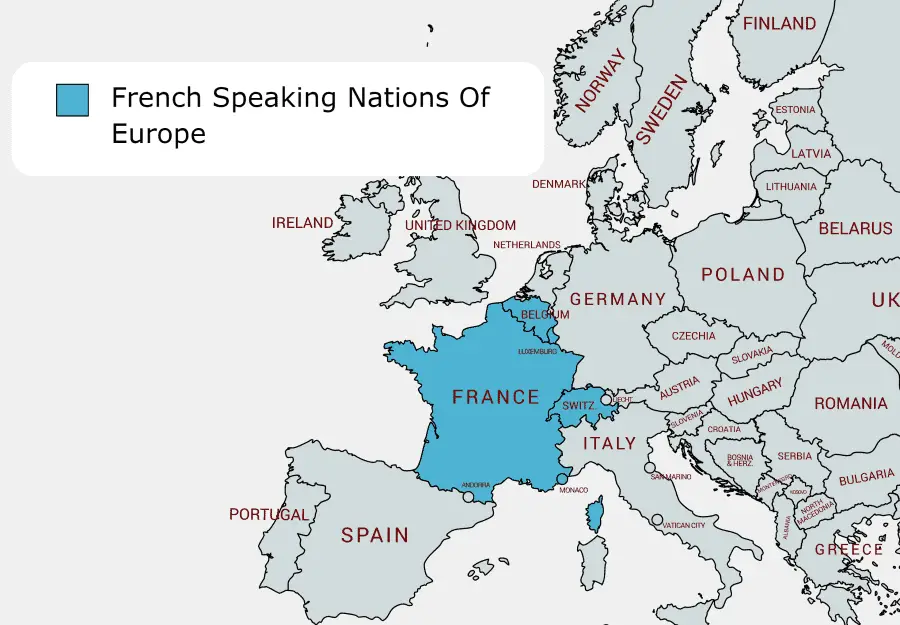
Belgium and its languages are definitely products of the environment around them. More on the history of the languages in Belgium later. At this point we want to consider the concentration of French around the Kingdom of Belgium and how it could influence its use.
Of course, there is France to the south and their view on foreign languages in their country is fairly well known. If you would like to know more about France and how widely English is spoken there, see my article here.
The French are notorious for their adherence to the French language and culture. Even with today’s current push toward globalism, a large contingent of the French are resisting and the state of foreign languages in their country bares this out.
This same sentiment can also be seen in the southern half of Belgium. There is a strong push to keep French as the dominate language and resistance to other languages found in the country or elsewhere is rather strong.
French is also spoken in Switzerland as one of its four official languages (together with German, Romansh, and Italian). Though the total number of speakers is under half what is found in Belgium, it is another example of holdouts of the French language in the face of other influences.
How Common Is French In Belgium Itself?
With the dominance of French throughout the educated classes in Europe through history, it is one of the historically admired languages of the world. For many years in countries like England and even Russia, you were more likely to find French spoken in upper class and royal courts than more native languages.
With Belgium’s history and proximity to other French speaking populations it is no wonder that the majority of the country speaks French on some level. It is notable that over half of the land mass of the country is designated as French speaking areas.
The Native French-Speaking Region Of Southern Belgium
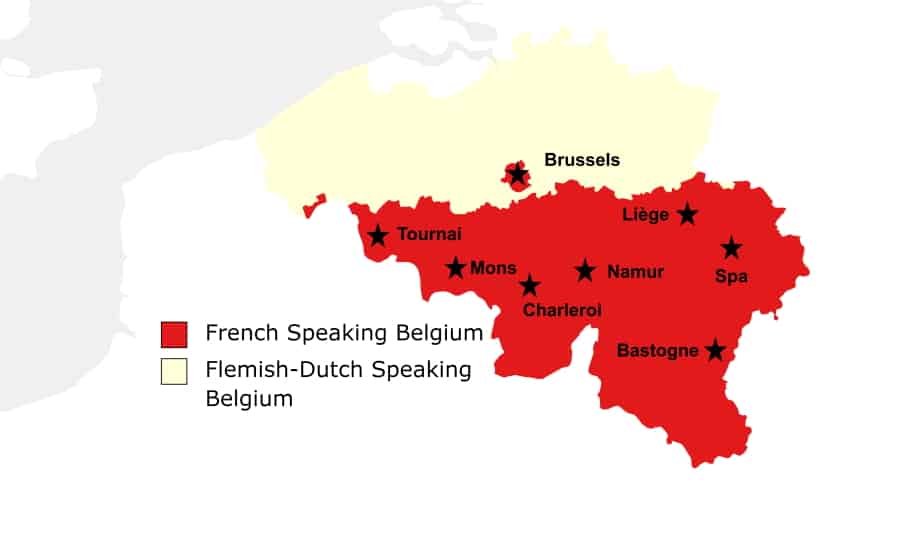
The French-speaking area in the south of Belgium is called Wallonia, and French speakers are known as Walloons. According to the official website of Wallonia, in 2018, 3,624,377 people were living in the region. It is not only the home of French speakers, and the eastern part of Wallonia is home to a small German-speaking population, as it borders Germany (wallonie.be).
There is not only a love for the French language and culture in this lower half of the country, but there is also a notable resistance to other languages. Even the Flemish-Dutch language is resisted in Wallonia when compared to how French is received in the north. There is both a sense of preservation for the French culture and its language wrapped up in this tendency. In this way, the Belgian French speakers are not that different than the natives of France to their south.
What Cities Have French Speakers?
There are several major French-speaking Belgian Cities. They are important for historical and commercial reasons and serves as centers in their respective regions. Visitors to these cities will expect to see French almost exclusively, with very little Flemish-Dutch.
All of these cities are situated in the Wallonia region in the south of Belgium. Some Walloon cities are:
Namur: Namur is the capital of Wallonia and the seat of the regional government. It is the birthplace of the French Fry, created after rivers froze over and fishing was impossible. It has a large tourist draw with its medieval fortress ‘The Citadel’ boasting 4.4 miles of underground passages.
With its designation as the capital of the region Namur will definitely be a place where native French can be found spoken on a regular basis. If it is Belgian French you are looking for, this will be the place to find it.
Tournai: Tournai is a UNESCO World Heritage Site. The centerpiece of the city is the Cathedral, which was constructed beginning in 1141. Add to it a university and an art college and you have a bustling community of vibrant young and old alike.
This city is known for its architecture. From the five towers and rose window of the Cathedral of Notre Dame to the Belfry of Tournai dominating the Grand Place triangular square, it is a French jewel to behold.
Liège: Settled since Roman times, Liège was originally called Leodium. It is the commercial center of the industrial Meuse Valley region. There are many foundries and factories, and it is a very important river port city.
French here can be heard from the medieval old town to the cultural hotspots like the Opéra Royal de Wallonie. The tourist areas may have some help in other languages for tourists, but this is a French speaking town.
Spa: A popular site for visitors for centuries due to the number of natural healing springs in the area. Since 1925, it has been home to the Formula 1 Belgian Grand Prix
Mons: Mons is the cultural capital of Wallonia. There are many theaters, museums, and galleries to visit. It is also the site of the first battle between the British and Germans in World War I.
Bastogne: Bastogne was the site of the Siege of Bastogne, part of the larger Battle of the Bulge in World War II. There are museums and memorials commemorating the people who fought in, and were affected by, the battle.
Charleroi: Originally the city was a fortress built by Spain and named after Charles II. The fortress and town was passed back and forth between France and Spain for many years and, for a time, was part of Austria. It is the site of the first battle of World War I.
Is French Spoken In Brussels?
Brussels is the capital of Belgium and is unique when it comes to spoken languages. There are definitely more bilingual speakers there. However, Brussels is technically a French-speaking city that is in a Flemish-Dutch-speaking area.
With its designation as the nation’s capitol and it’s ties to the UN and EU, Brussels takes on a distinct multilingual feel. Though this is the case. French speakers make up the majority of the population of Brussels with about 80% of the city and immediate surrounding areas speaking French as their first language.
Although English is not an official language, 55% of people can speak English. Belgium is home to the European Union and NATO headquarters, so you can expect to encounter a wide diversity of other languages spoken there when visiting.
With Brussels being the defacto capital of the EU, it is no wonder there are so many languages heard daily in the city.
We knew a couple that were foreign service agents that were stationed for years in Belgium working in the city. My husband had a conversation with him about the French that he learned through FSI and how useful it was in Brussels. He said that English was used by many in that city, but only a short drive to the south and no one was interested in speaking English.
Since Flemish-Dutch and French are the most common languages spoken in Belgium, visitors to the capital, Brussels, will see signs in both languages and encounter many bilingual speakers. In other cities, only either the French or Dutch language respectively is widely spoken.
Brussels sits in the middle of a language struggle between the Dutch language and cultural influence in the north and the French language and culture in the south. This doesn’t mean that it is not a French city by any means. You can find plenty of French in the metropolitan area.
Don’t expect to find French speakers in Flanders though, the Flemish Dutch-speaking area. People are more likely to speak decent English than bad French, so if you want to practice using a good level of French, stay in Wallonia or Brussels.
Spoken French Versus Other Languages of Belgium
Located in Northern Europe, Belgium is sandwiched between France, The Netherlands, Germany, and Luxembourg. Its geographical location plays a major role in the languages that are commonly spoken in Belgium. There is also a strong historical component as well with a vast story of changing rulers and languages for people in this area.
Officially, Belgium has three languages
Marked by three distinct geographical areas of concentration, Belgium officially reports three main languages. Though immigration and the presence of the UN bring many diverse language to the country, the Belgian people claim these three:
- Flemish-Dutch
- French
- German
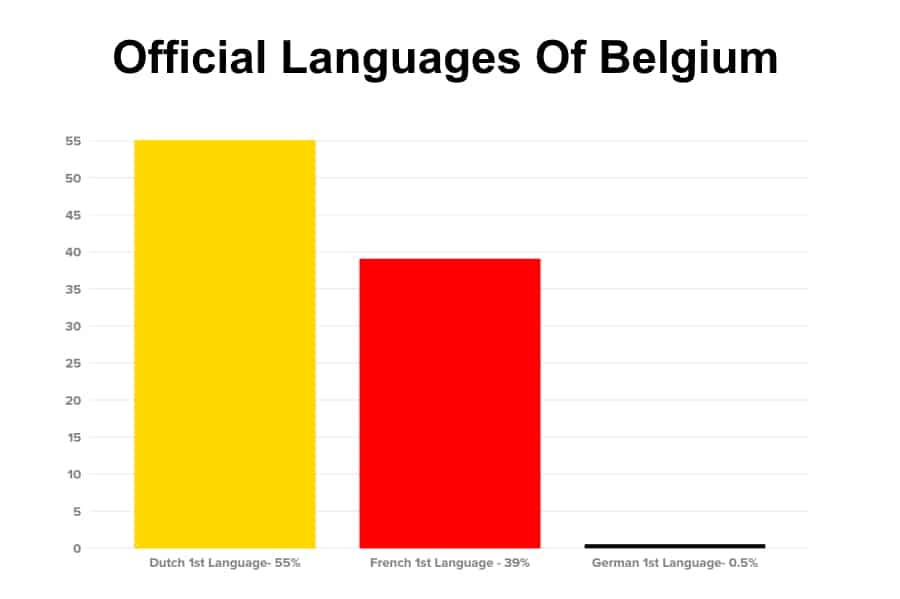
Flemish-Dutch is the most widely native spoken language in Belgium with it being spoken as a primary language by 55% of the population. The main language for 39% of Belgians is French, and only 0.5% of the population speaks German. This on the surface looks like Dutch is the more commonly spoken language overall in Belgium. Yet, is this the whole story?
These official numbers of native languages fails to take a very important number into account. The people in Belgium are highly multilingual and there are strong public opinions about French and Dutch. Does Flemish-Dutch hold the top spot for most spoken language when second language numbers are taken into account?
The Real Picture Of French In Belgium
Belgians are strongly divided about two of their major official languages. Many on the boarder of the southern – northern language divide don’t see the virtually imposed bilingualism as a plus, but as an imposition and nuisance. In a study here and another here researchers note the unofficial strong ties the people have to their respective languages. This is especially true in the French speaking regions of Wallonia.
Belgium has often been held up as an example of the model European society with its equitable treatment of the rights of the French speaking and Flemish-Dutch speaking communities. There is a great disparty though in the willingness of the people to speak languages other than the one prevalent in their region. And the two cultures of Belgium surrounding these languages are quite different.
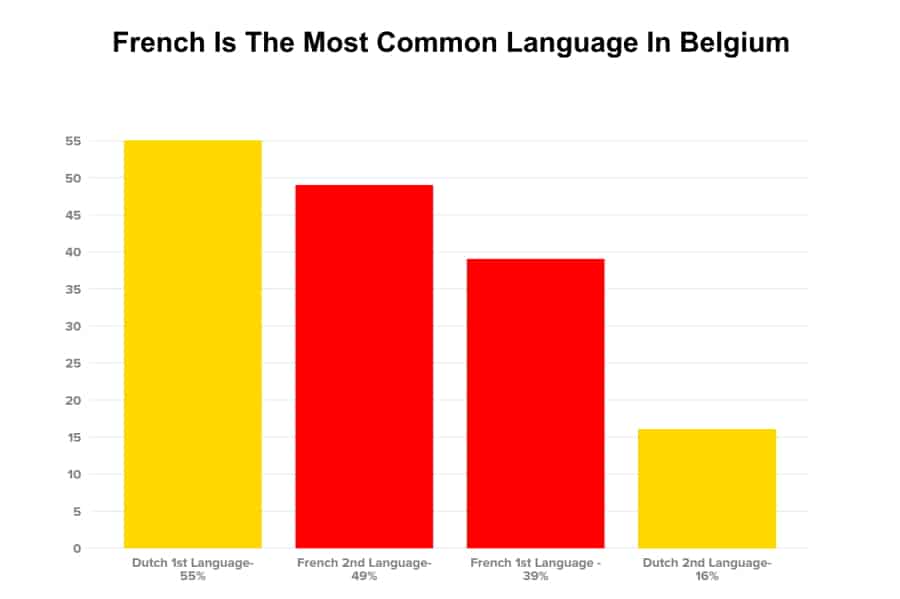
In the north, the Dutch speaking populations are fairly open to speaking French in comparison to the French speaking population in the south using Flemish-Dutch. French is spoken as a second language by 49% of the Belgian population as opposed to 16% of the population speaking Flemish-Dutch as a second language.
What this means is that French becomes the most common spoken language in Belgium due to the reluctance of the Walloons (those living in Wallonia) in the south to speak Dutch. The total number of French speakers in Belgium reach the majority at 88% of the population.
With that being said, there are many that visit different parts of the country and through their personal experience find that Dutch is more widely heard than French. This can be due to the specific places frequented and the subjective nature of personal experience. So, though some may have a different experience, French is the winner by sheer number of speakers of the language, whether they use it regularly or not.
The cultures are similarly divided in many ways. My husband Mat had a German speaking partner for many years. When talking about the situation in Belgium, Marcus noted that the northern portion of the country had a northern European work ethic with less time off and longer work days. The southern French areas he noted lived a more laid back life and enjoyed cafes and outdoor recreation.
Though this is a German perspective looking at Belgium and its people from the outside, it gives us a glimpse at how Europeans see the Dutch/French divide in Belgium.
Is French Common On Belgian Television And Movie Screens?
Most movie cinemas in southern Belgium will feature the French dubbed version of foreign produced films. This is true of most children’s films especially. In a large city like Brussels, independent and indie film cinemas will show some films in their original language. Yet, in southern Wallonia, it is less common.
There are dedicated French television stations in Belgium that broadcast exclusively in that language. They are understandably based primarily in the southern parts of the country in the mostly French speaking Wallonia. There are also French language shows from Belgian creators that appear on networks and providers like Netflix and Showtime.
Here are a list of a few of the French language speaking shows that can be found from Belgian French producers, writers, and directors:
Zone Blanche
In this French language police drama, a French speaking fictional small town on the edge of a forest is highlighted as the location of several grizzly murders. There is no phone service in the area and strange happenings occur in the vicinity. A unique prosecutor new to the job teams up with a police chief to try and solve the crime spree.
This is a good example of French speaking culture in Belgium as expressed in their entertainment. Though there are English language shows produced from the northern section of the country, the French speaking populace to the south are not interested for the most part. These French shows are in demand in Wallonia especially.
Into the Night
In this French language apocalyptic drama, people landing from a flight find that they must run from the radiation of the sun and seek the cover of darkness. They race from one city to the next trying to find cover.
As the original setting is an overnight flight from the city of Brussels, it is intended for Belgian audiences. This is one that is beloved the world over by French speakers and is a great addition to anyone’s library whether a French language learner or native.
La Trêve
This is a police / crime drama set in motion by the finding of the body of a young man. Like many of these shows in Belgium and around the world, much of this background to the relationship and family drama centered on different characters in the story.
The French in this one is Belgian with a mix of metropolitan or Parisian French. As with many languages of the world, these amount to slight accents and variations of each that usually are only noticeable to natives.
Is French Common In The Belgian Workplace?
As may be expected, in southern Belgium in most of the Wallonia region, French is used on a regular and consistent basis in the professional work environment. This means that French is prevalent in spoken form and in written documents as well as computer programs.
Likewise, Dutch is more common (and English in some areas) in much of the north of Belgium. This Flemish-Dutch speaking region is called Flanders and is distinct not only in language, but in professional and business culture.
One interesting observation that business travelers will find is that many business cards in Belgium will be in both languages due to the relatively small size of the country and thus the business and commercial market. Though language and culture may separate the two halves of the country, pragmatics and practicality can sometimes build bridges that other things cannot.
Why Do Belgians Speak French?
Belgium’s multilingualism is due to a number of unique circumstances. Belgium is a relatively young country. Although people have lived in the geographic location of Belgium for thousands of years, as a country, Belgium was only established in 1830.
It’s Because of Charlemagne
Charlemagne united most of Central Europe during the Middle Ages but was forced to divide his kingdom between his three grandsons at the Treaty of Verdun in 843. This division formed early France, Germany, and the Low Countries. Dutch-speaking Flanders became part of German-Frankish lands, and French-speaking Wallonia stayed part of the Holy Roman Empire.
The Low Countries were a loose organization of independent feudal states that were active in trade and were important ports in Northern Europe. The Belgian cities that were part of the Low Countries include Bruges, Ghent, and Ypres.
Belgium Had Many Rulers
Over the next 1,000 years, what would become Belgium was ruled by the Spanish, the French, and the Austrians. After the fall of Napoleon, the United Kingdom of the Netherlands was founded. This Kingdom did not last long, though. In 1830, the Belgians revolted, and as a result, the Kingdom was divided into Belgium, Luxembourg, and The Netherlands.
As you can see, history played a major role in the languages that Belgians speak. Geography is also an important factor. If you were to draw a line across the middle of Belgium, the northern half closest to the Netherlands, Flanders is where Flemish Dutch is spoken. The south of Belgium, next to France, is where the majority of French speakers are.
Belgium is an Interesting Country
Since its formation in 1830, the country has experienced political differences between the Flanders and Wallonia. There have been various movements to split the country in two or join France and the Netherlands. While these movements haven’t gained much traction, it does illustrate the divide between the two regions.
Belgium is a small country with a long and interesting history. Centuries of being occupied and ruled by different countries are the major reason for so many official languages. While there are national and political differences between French and Flemish-Dutch speakers, they are all important to making Belgium such a culturally and historically rich country.
Differences Between French and Belgian French
The difference between the French spoken in France and the French spoken in Belgium is similar to the differences between British English and American English. They are pretty much the same language, but vocabulary and accents differ. Here are some of the main differences:
- Accent: There is not a Belgian-French accent, but there are regional accents, like Walloon, Flemish, Brussels, etc. Belgians can speak slower than the French can. Belgians will also pronounce things differently; their letter “r” is more defined. Nasal vowels also sound different in Belgium.
- Counting: Counting numbers above 69 in French is unlike other Romance languages. For example, instead of a word for 70, in French, you say soixante-dix (60-10). In Belgium, however, they have words for these numbers, except for 80-89, which is handled the same way as in France.
- Vocabulary: This is similar to all languages that are spoken in different countries. Just like British English and American English, there are words said in Belgium that aren’t said in France and vice versa. The words for daily meals are a perfect example of this major difference: Le déjuener (FR)/ le dîner (BE) – Lunch, le dîner (FR)/ le souper (BE) – dinner.
Should I Learn French To Function In Belgium?
Our answer when anyone asks should they learn a language for most any reason is, yes. That being said, learning an language can most definitely be a monumental task. There are several options when it comes to relating to the French speaking population in Belgium.
- Simply be respectful and don’t expect the natives of any country to speak your preferred language simply because you have arrived.
- Learn basic phrases to show effort in connecting even if you aren’t planning on studying the language in depth.
- Take on the French language in earnest. It really is doable by anyone.
Though to be honest, functioning in Belgium will really depend on where you go. If you stay in the major cities you will be able to get around. If in Brussels, you may even find a good deal of English and other languages besides French and Dutch. It will be more difficult notably to use only English in Belgium than in a country like Norway or Sweden, but it is possible.
Basic French Words And Phrases To Help You Make An Effort
Here is a short list of some of the most common words and phrases to get by with in any French speaking country. Simply making an effort can go a long way in a business, education, or personal situation.
| English | French |
| Hi | Salut |
| How are you? | Comment ça va ? |
| Well, thanks. And you? | Bien, merci. Et toi ? |
| I am very well. | Je vais très bien. |
| Welcome | Bienvenue |
| map | carte |
| hospital | hôpital |
| no | non |
| yes | oui |
| toilet | WC |
Learn French And Become Fluent – It Takes Less Time Than You Think
If you are wanting to truly learn French and do it in the easiest and fastest way possible I have several suggestions for you. There are all in one language learning programs, short cut methods by world renowned polyglots, and advanced methods to help you move quickly through the beginner and intermediate stages of French.
If you are interested in truly learning French and becoming solidly bilingual, visit my language tools page and see what I recommend for you to quickly become a French speaker.
Final Talking Point About Commonly Spoken French Is In Belgium
Hopefully this resource detailing the level and commonality of the French language in Belgium will help you in your quest to learn more about the language and people of this northern European country. Both the language and the country have long and rich histories that will interest many education and communication enthusiasts.
French is the most commonly spoken language in Belgium and can be found throughout the entire country. The levels of spoken French as well as the proficiency of the speakers drops off sharply as you move north. This is especially true in Flanders, the area around and to the north of Brussels.
With French growing in popularity around the world, Belgium will not be abandoning the language of its history and neighbors to the south any time soon.
Sources
https://www.fluentu.com/blog/french/language-spoken-in-belgium/
https://www.theintrepidguide.com/what-language-is-spoken-in-belgium/#.YEfDP2hKjIU
https://theculturetrip.com/europe/belgium/articles/belgium-a-brief-history-of-how-it-all-began/
https://theculturetrip.com/europe/belgium/articles/the-top-10-things-to-do-and-see-in-namur/
https://trip101.com/article/things-to-do-tournai-belgium
https://www.britannica.com/place/Liege-Belgium
https://www.puretravel.com/blog/2013/08/25/top-5-things-to-do-in-spa-belgium/
https://www.itinari.com/mons-5-facts-you-did-not-know-about-it-958a
https://www.britannica.com/place/Mons
https://walloniabelgiumtourism.co.uk/en-gb/3/where-to-go-in-wallonia/destinations/bastogne
https://www.britannica.com/place/Charleroi
https://frenchbien.com/differences-between-belgian-french/
https://www.vox.com/2014/6/30/5855352/the-case-against-belgium
https://www.worldtravelguide.net/guides/europe/belgium/history-language-culture/
